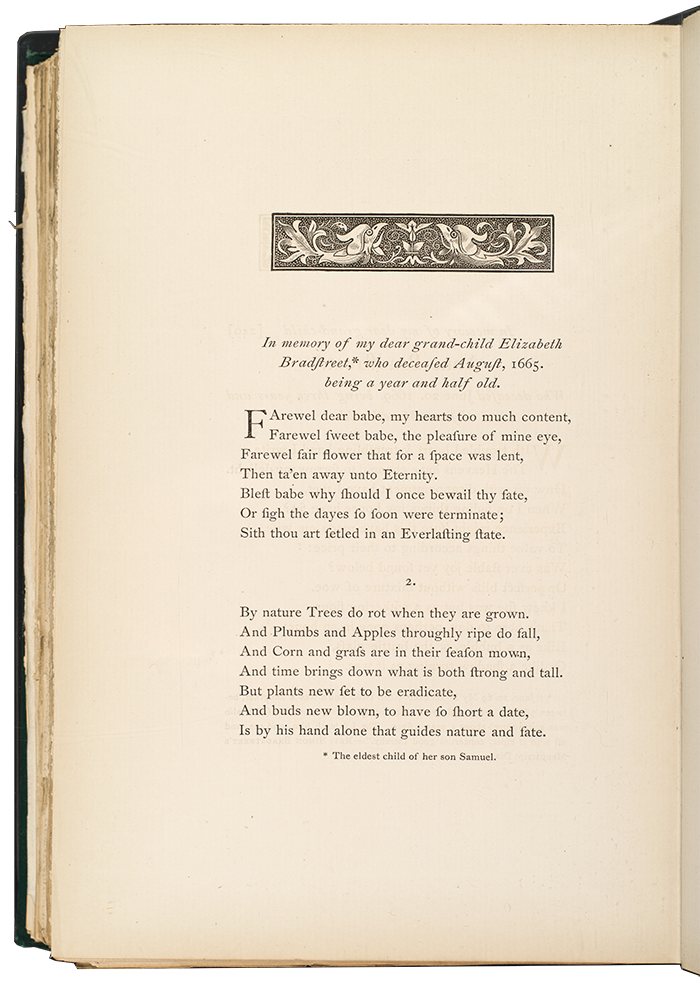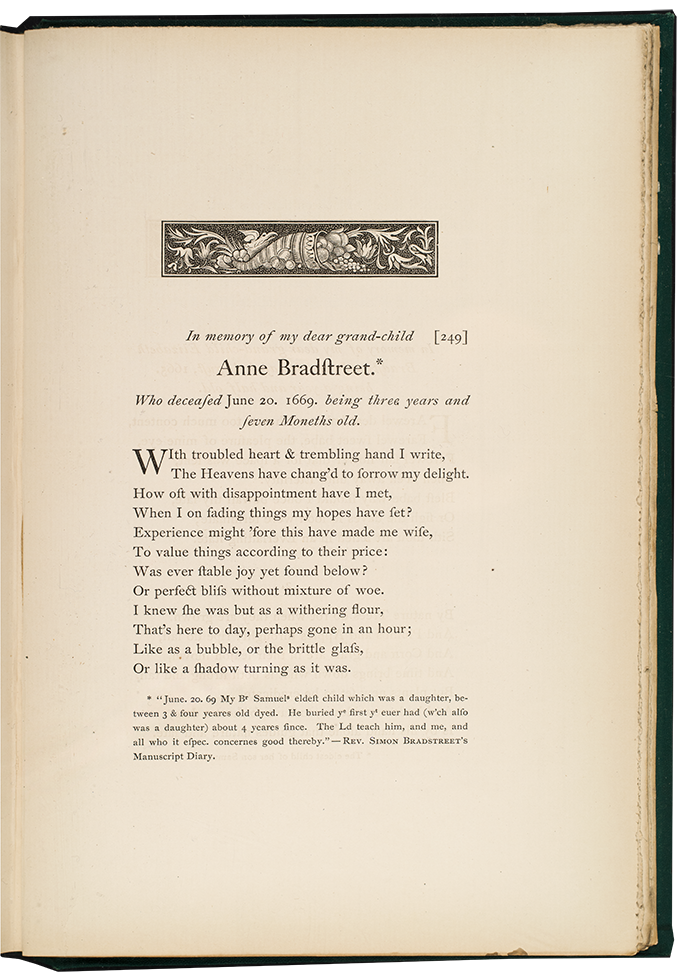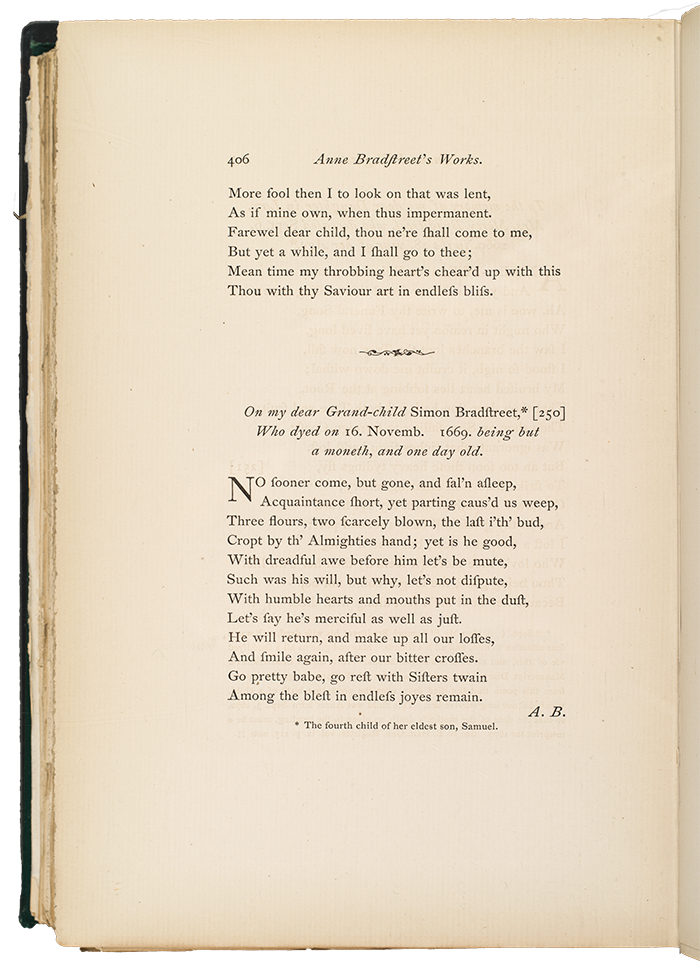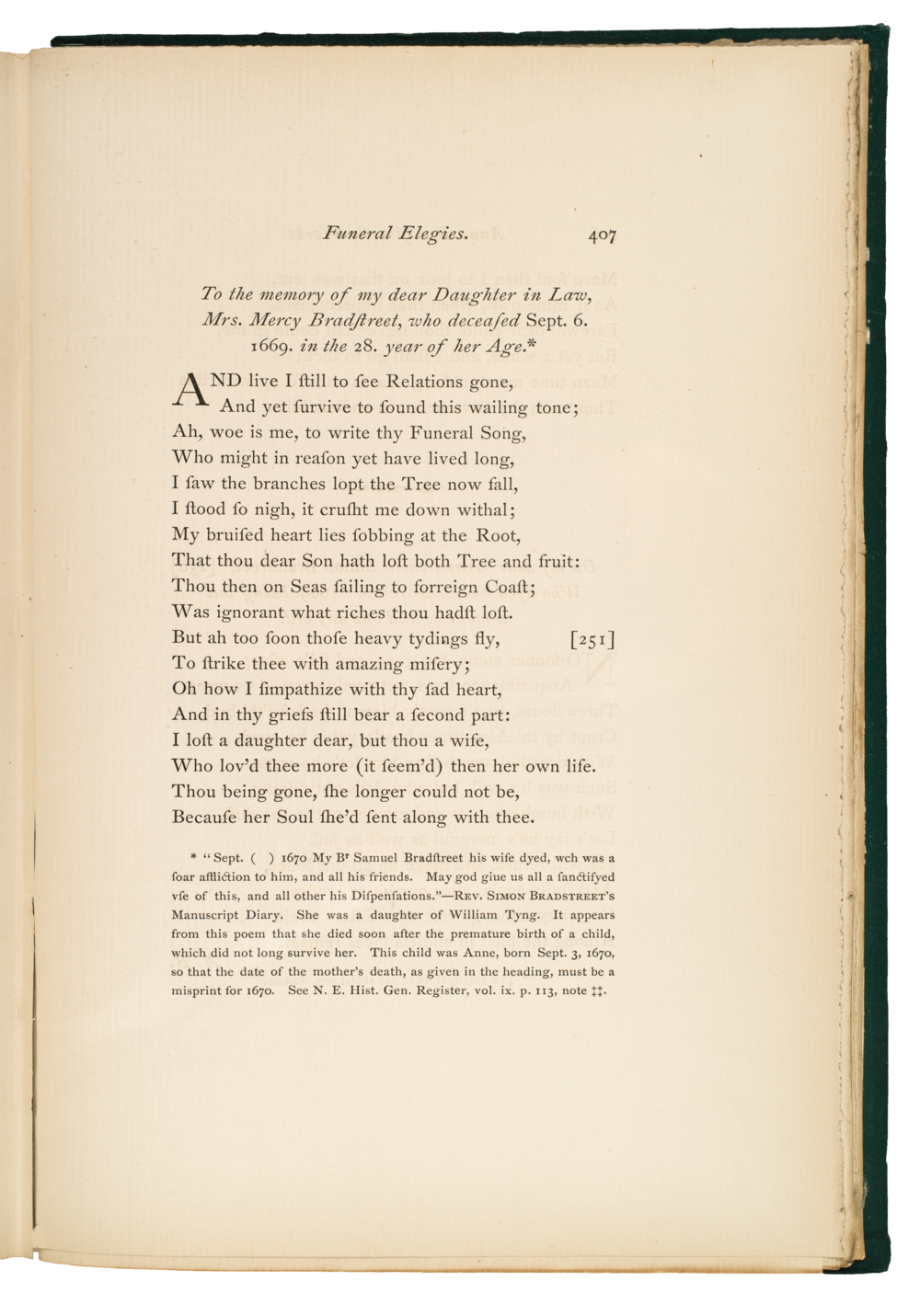With Troubled Heart and Trembling Hand I Write

Document Text
Farewel dear babe, my hearts too much content,
Farewel sweet babe, the pleasure of mine eye,
Farewel fair flower that for a space was lent,
Then ta'en away unto Eternity.
Blest babe, why should I once bewail thy fate,
Or sigh the dayes so soon were terminate;
Since thou art settled in an Everlasting state.
By nature Trees do rot when they are grown,
And Plumbs and Apples thoroughly ripe do fall,
And Corn and grass are in their season mown,
And time brings down what is both strong and tall.
But plants new set to be eradicate.
And buds new blown, to have so short a date,
Is by his hand alone that guides nature and fate.
Anne Bradstreet, "In memory of my dear grand-child Elizabeth Bradstreet,* who deceased August, 1665. Being a year and half old," The Works of Anne Bradstreet in Prose and Verse (Charlestown: A. E. Cutter, 1867). New-York Historical Society Library.
*The eldest child of her son Samuel.

In memory of my dear grandchild Anne Bradstreet. Who deceased June 20, 1669. Being three years and seven Months old
Anne Bradstreet, "In memory of my dear grandchild Anne Bradstreet. Who deceased June 20, 1669. Being three years and seven Months old," The Works of Anne Bradstreet in Prose and Verse (Charlestown: A. E. Cutter, 1867). New-York Historical Society Library.
Document Text
With troubled heart & trembling hand I write,
The Heavens have chang'd to sorrow my delight.
How oft with disappointment have I met,
When I on fading things my hopes have set?
Experience might 'fore this have made me wise,
To value things according to their price.
Was ever stable joy yet found below?
Or perfect bliss without mixture of woe?
I knew she was but as a withering flower,
That's here to day, perhaps gone in an hour;
Like as a bubble, or the brittle glass,
Or like a shadow turning as it was.
More fool then I to look on that was lent,
As if mine own, when thus impermanent.
Farewell dear child, thou ne're shall come to me,
But yet a while, and I shall go to thee;
Mean time my throbbing heart's chear'd up with this
Thou with thy Saviour art in endless bliss.
Anne Bradstreet, "In memory of my dear grandchild Anne Bradstreet.* Who deceased June 20, 1669. Being three years and seven Months old," The Works of Anne Bradstreet in Prose and Verse (Charlestown: A. E. Cutter, 1867). New-York Historical Society Library.
*"June. 20. 69 My Br Samuels eldest child which was a daughter, between 3 & four yeares old dyed. He buried ye first yt ever had (w'ch also was a daughter) about 4 yeares since. The Ld teach him, and me, and all who it espec. concernes good thereby."—Rev. Simon Bradstreet's Manuscript Diary

On my dear Grand-child Simon Bradstreet, Who died on 16 November 1669. Being but a month, and one day old
Anne Bradstreet,"On my dear Grand-child Simon Bradstreet, Who died on 16 November 1669. Being but a month, and one day old," The Works of Anne Bradstreet in Prose and Verse (Charlestown: A. E. Cutter, 1867). New-York Historical Society Library.
Document Text
No sooner come, but gone, and fal'n asleep,
Acquaintance short, yet parting caus'd us weep,
Three flours, two scarcely blown, the last i'th' bud,
Cropped by th' Almighties hand; yet is he good,
With dreadful awe before him let's be mute,
Such was his will, but why, let's not dispute,
With humble hearts and mouths put in the dust,
Let's say he's merciful as well as just.
He will return, and make up all our losses,
And smile again, after our bitter crosses.
Go pretty babe, go rest with Sisters twain
Among the blest in endless joys remain.
Anne Bradstreet,"On my dear Grand-child Simon Bradstreet,* Who died on 16 November 1669. Being but a month, and one day old," The Works of Anne Bradstreet in Prose and Verse (Charlestown: A. E. Cutter, 1867). New-York Historical Society Library.
"*The fourth child of her eldest son, Samuel."

To the memory of my dear Daughter in Law, Mrs. Mercy Bradstreet, who deceased September 6, 1669. In the 28 Year of her Age
Anne Bradstreet, "To the memory of my dear Daughter in Law, Mrs. Mercy Bradstreet, who deceased September 6, 1669. In the 28 Year of her Age," The Works of Anne Bradstreet in Prose and Verse (Charlestown: A. E. Cutter, 1867). New-York Historical Society Library. 1/2
Document Text
And live I still to see Relations gone,
And yet survive to sound this wailing tone;
Ah, woe is me, to write thy Funeral Song,
Who might in reason yet have lived long,
I saw the branches lopt the Tree now fall,
I stood so nigh, it crusht me down withal;
My bruised heart lies sobbing at the Root,
That thou dear Son hath lost both Tree and fruit:
Thou then on Seas failing to forreign Coast;
Was ignorant what riches thou hadst lost.
But ah too soon those heavy tydings fly,
To strike thee with amazing misery;
Oh how I sympathize with thy sad heart,
And in thy griefs still bear a second part:
I lost a daughter dear, but thou a wife,
Who lov'd thee more (it seem'd) then her own life.
Thou being gone, she longer could not be,
Because her Soul she'd sent along with thee.
One week she only past in pain and woe,
And then her sorrows all at once did go;
A Babe she left before, she soar'd above,
The fifth and last pledg of her dying love,
E're nature would, it hither did arrive,
No wonder it no longer did survive.
So with her Children four, she's now a rest,
All freed from grief (I trust) among the blest;
She one hath left, a joy to thee and me,
The Heavens vouchsafe she may so ever be.
Chear up, (dear Son) thy fainting bleeding heart,
In him alone, that caused all this smart;
What though thy strokes full fad & grievous be,
He knows it is the best for thee and me.
Anne Bradstreet, "To the memory of my dear Daughter in Law, Mrs. Mercy Bradstreet, who deceased Sept. 6. 1669. In the 28 Year of her Age,*" The Works of Anne Bradstreet in Prose and Verse (Charlestown: A. E. Cutter, 1867). New-York Historical Society Library. 1/2
"*'Sept. ( ) 1670 My Br Samuel Bradstreet his wife dyed, wch was a soar affliction to him, and all his friends. May god give us all a sanctifyed use of this, and all other his Dispensations.'—Rev. Simon Bradstreet's Manuscript Diary. She was a daughter of William Tyng. It appears from this poem that she died soon after the premature birth of a child, which did not long survive her. This child was Anne, born Sept. 3, 1670, so that the date of the mother's death, as given in the heading, must be a misprint for 1670. See N. E. Hist. Gen. Register, vol. ix. p. 113, note."
Background
The poetry of Anne Dudley Bradstreet shows readers what it was like to live in colonial New England. Anne was born in England in 1612, the daughter of the steward of the Earl of Lincoln. Her father's position meant she had better access to books and education than most other women in her time, and by the time she reached adulthood, she had developed the hobby of writing poetry. In 1628, Anne married her father's apprentice, Simon Bradstreet.
In 1630, a big change came to Anne's life. She and her family were Puritans, a type of Christians who were persecuted by the English government, and her husband and her father decided to leave England forever and move to the Puritan colony Massachusetts. As a Puritan woman, Anne was expected to obey the men in her life, so on April 8 she set sail with them for the New World.
Anne's father and husband were both named assistant governors of the new colony, and she moved among the colony's elite for the rest of her life. Even so, her life was very difficult, especially compared with her luxurious childhood. Anne and her husband moved four times in their first fifteen years in the colony, and they had to build their life from the ground up with the limited resources available to them. Life in Puritan society was also very strict—one of their moves was prompted by complaints that Anne's father's home was too fancy. Throughout all of this, she bore and raised eight children. Her privileged position meant she could afford to have servants to help her care for her household, which gave her time to write.
In 1650, Anne's brother-in-law brought a collection of her poems to London and got them published. The book, calledThe Tenth Muse lately Sprung Up in America, made Anne the first published female poet of the New World.
About the Resources
Life expectancy in the early colonies was short, and the death of a loved one was a common occurrence. War, disease, accident, lack of medical care, and malnutrition were all common causes of death for men, women, and children.
Collected here are four poems Puritan housewife Anne Bradstreet wrote in 1665 and 1669, mourning the deaths of four grandchildren and her daughter-in-law Mercy. Mercy and the children were part of her son Samuel's family, so these poems also show how much loss could happen in just one nuclear family. Through these poems we feel the heartbreak Anne experienced after each loss and her struggle to reconcile her religious faith with the harsh reality of life in the colonies. They are a poignant window into the agonies of life in early colonial America.
Vocabulary
- apprentice: A person who learns a trade from a more skilled employer.
- below: On earth.
- bewail: Mourn.
- blown: Blossomed.
- content: Joy.
- deceased: Died.
- eradicate: Destroyed.
- e're: Before.
- 'fore: Before.
- malnutrition: Sickness from lack of proper food.
- ne're: Never.
- nigh: Close.
- Puritans: A group of English Protestants who left England for the New World to start their own settlements where religion would govern daily life.
- steward: A person who looks after another person's property.
- terminate: Ended.
- tydings: News.
- twain: Two.
- woe: Sadness.
- withal: Also.
- withering: Dying.
Discussion Questions
- What do these poems reveal about life in the early English colonies?
- How does Anne reconcile her anger and grief with her Puritan faith?
Suggested Activities
- Cross-curricular opportunity: Ask your English teacher colleagues to analyze these poems with students while you are teaching about life in early colonial New England.
- Use these poems when discussing life in the early colonies to demonstrate how even the most well-off families were affected by high mortality rates.
- Invite students to follow in Anne Bradstreet's footsteps and write poetry that describes life in the 21st century.
- Ask students to analyze these poems for evidence of how Anne reconciles her Puritan faith with the hardships of life in the colonies.
- Invite students to analyze more of thepoetry of Anne Bradstreet to learn more about the life and thoughts of a Puritan woman in seventeenth-century Massachusetts.
- Compare Anne Bradstreet's poetry with the poetry ofSor Juana Inés de la Cruz. What similarities do they share? What differences? What accounts for the differences between the works? How do these two religious women reconcile their faith with their circumstances?
- Children in the New World faced many challenges and dangers. Combine these poems with any of the following resources for a lesson about childhood in the early colonial period: Hannah Holland of Virginia, Malitzen of New Spain, Kateri Tekakwitha of New Franc e,Lisbeth Anthonijsen, Life on theEncomienda , The Middle Passage, Children at Work, and Education in New France.
- Religion was a powerful force in the daily lives of women in the European colonies of the Americas. Combine this life story with any of the following resources for a lesson on colonial women and religious life: Life Story: Doña Teresa de Aguilera y Roche, Witchcraft in Bermuda, Life Story:Kateri Tekakwitha, and Life Story: Lady Deborah Moody.
- Anne Bradstreet was one of many women made important contributions to the Enlightenment. Combine her story with the resources below for a lesson about women and the Enlightenment in the New World: Patent for Cleaning and Curing Corn, A Nun Challenges the Patriarchy, and Life Story: Maria Sybilla Merian.
Themes
New-York Historical Society Curriculum Library Connections
- For more resources relating to women in the English Colonies, see New World—New Netherland—New York .
With Troubled Heart and Trembling Hand I Write
Source: https://wams.nyhistory.org/early-encounters/english-colonies/anne-bradstreet-mourning-poetry/
0 Response to "With Troubled Heart and Trembling Hand I Write"
Post a Comment